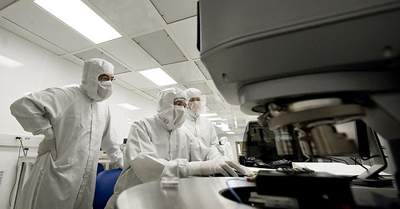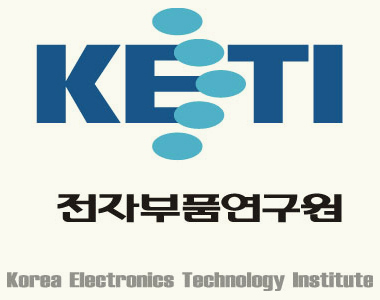
Health Technologies Top List of New Calit2 Research Grants to UC San Diego Faculty
17 faculty projects get 12 months and $826,000 for strategic research projects
By:
- Doug Ramsey
Published Date
By:
- Doug Ramsey
Share This:
Article Content

Faculty including MAE professor Renkun Chen will use Calit2's Nano3 cleanrooms (pictured) and other facilities and services as part of their CSRO research project; Chen's team will test a thermal energy harvesting device that could be used in self-powered electronics such as sensor networks.
The University of California, San Diego division of the California Institute for Telecommunications and Information Technology (Calit2) has given the green light to 17 new projects funded through the Calit2 Strategic Research Opportunities (CSRO) program. All told, the winning proposals garnered more than $826,000 in support from Calit2 for the year-long projects, effective October 1, 2012. That is an 18 percent increase in funding compared to the inaugural round of CSRO grants awarded in 2010.
CSRO grants typically involve a cash portion as well as in-kind support to pay for Calit2 services, personnel or facilities. The institute awarded a total of $227,510 in cash and $375,992 for in-kind services (which are also funded from private gifts). The remaining $223,372 in support will directly fund graduate student researchers (GSRs) in the form of CSRO Fellowships (see below).
“We are pleased with the high quality of proposals this year and we are looking for additional funds to support some of the projects that would have received a go-ahead if more funding were available,” said Calit2 UCSD Division Director Ramesh Rao, who also holds a Qualcomm Endowed Chair in Information Technologies and Telecommunications in the Electrical and Computer Engineering department of the Jacobs School of Engineering. “Having said that, we are also delighted at the extent of external support for this peer-reviewed grant program, and we hope to attract other donors.”

As part of its recent gift to Calit2 for the establishment of its International Innovation Initiative (i3), Korea's KETI provided financial support for the Calit2 Strategic Research Opportunities (CSRO) program.
Calit2 uses no state or taxpayer dollars to fund the CSRO grant program. The 2012 awards rely exclusively on gift funds to Calit2, primarily by longtime industry partner Qualcomm, Inc. For the first time, however, a foreign partner – the Korea Electronics Technology Institute (KETI) – has provided very substantial support for the CSRO program. Some $295,000 in gift funds from KETI to Calit2 will help fund CSRO projects, on top of $110,000 in matching funds from KETI for two of the projects.
All four of Calit2’s strategic research ‘thrusts’ to benefit society – health, culture, the environment and energy – were represented among the winning projects. Seven of the 17 winners are in the health space, including a photonic solution to the problem of errors when guiding a needle to a biopsy site, and a wireless infrastructure for cognitive health care. Five culture-related projects, three about the environment, and one energy project were selected. The health projects alone will be enabled by the four technologies spelled out in Calit2’s Strategic Vision: wireless, photonics, cyberinfrastructure, and nano-micro-electromechanical systems, or nano-MEMS.
HEALTH
- Virtual San Diego Environment for Visualizing the Exposome, PI Kevin Patrick, Family and Preventive Medicine, and Director, Calit2 Center for Wireless and Population Health Systems;
- Distributed Health Initiative: Towards a Global Tricorder, PI Albert Lin, Research Scientist, Calit2;
- Cognitive Healthcare: An Enabling Android Infrastructure, PI Tara Javidi, Electrical and Computer Engineering;
- Automatic Radiotherapy Treatment Plan Recommendation, PI Yuanyuan Zhou, Computer Science and Engineering;
- Creating a Communications Mesh Network to Support San Diego Medical Centers During Disasters, PI Jay Doucet, School of Medicine;
- Flexible EEG Patch for Point-of-Care Health Monitoring, PI Deli Wang, Electrical and Computer Engineering;
- Optically-Assisted Needle Guidance, PI Sadik Esener, NanoEngineering, Electrical and Computer Engineering.
CULTURE
- Socially Engaged Speculative Media Initiative, PI Michael Trigilio, Visual Arts;
- Multimodality of Social Robot: Sense of Smell, PI Morana Alac, Communication;
- RoomShare: A Tele-Membrane, PI Jurgen Schulze, Research Scientist, Calit2;
- Multi-User Graphics with Interactive Control (MUGIC) Protocol, PI Shahrokh Yadegari, Department of Theatre and Dance.
- Camelot, a Multi-Camera Stereo Video Environment Recorder, PI Truong Nguyen, Electrical and Computer Engineering;
ENVIRONMENT
- Towards Immediate-Mode Visualization of Underwater LIDAR Data, PI Jules Jaffe, Scripps Institution of Oceanography;
- Volume Visualization of 3D Underwater Microscope Data, PI David Kriegman, Computer Science and Engineering;
- Multi-Sensor Fusion for Locating, Monitoring, Foraging and Breeding Behavior, and Assessing Habitat Use of Whale Sharks, PI Ryan Kastner, Computer Science and Engineering;
ENERGY
- Quantum-Structure Enabled Thermal Energy Harvest for Self-Powered Electronics, PI Renkun Chen, Mechanical and Aerospace Engineering.
Forty-five proposals were reviewed by the CSRO Program Committee, chaired by former ECE professor and now Calit2 functional manager Curt Schurgers. The 17 winning proposals represented a relatively high 38 percent acceptance rate.
All faculty and research scientists on the UC San Diego campus were eligible to apply for CSRO support, even those not previously affiliated with the multidisciplinary institute
Share This:
You May Also Like
Stay in the Know
Keep up with all the latest from UC San Diego. Subscribe to the newsletter today.


